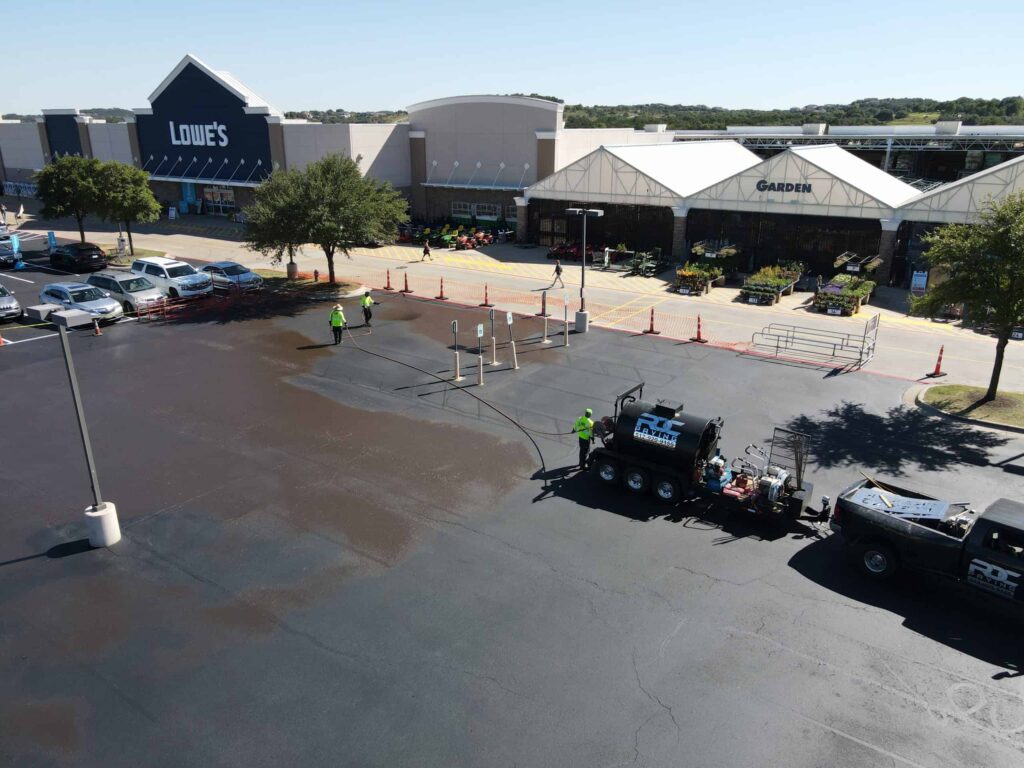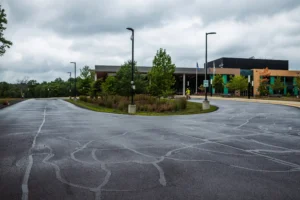If a little of something is good, then more of it must surely be better. At least, that is what many people believe. If one capful of laundry detergent is good, three capfuls must be better. If a dollop of conditioner makes your hair smooth and silky, using half the bottle has to provide additional benefits. If a serving of albacore tuna each week is healthy, then it must be better to eat it twice a day for months at a time. Often, more is useless, and it can sometimes be harmful. Unfortunately, some people believe that they will obtain better protection for their asphalt pavements through thicker sealcoating. Like all of the above examples, the key is to use the right amount of sealant for the job.
What Is Meant by Sealcoating Thickness
There are two ways to think about the thickness of asphalt sealcoating. The first is the thickness of each coat that sealcoating contractors apply, and the second involves the frequency for sealcoating asphalt pavements. In neither case will thicker be better.
Why Are Thicker Applications of Sealcoating Not Better?
Asphalt sealcoating contains more water than all other ingredients combined. For parking lot seal coating in Austin to cure properly, this water must evaporate properly. Every asphalt maintenance contractor should know that thicker coats lose their water much slower than thin coats. If the coats are too thick, complete curing may never occur, leaving you with a mess that can be easily tracked or washed away. This is why reputable contractors apply multiple thin coats when sealcoating Austin TX pavements. Your pavement will be properly protected, which is the primary purpose of sealcoating asphalt pavements.
Why Is It Not Better to Apply Seal Coating More Frequently?
Some property owners find it more convenient to schedule and budget for their asphalt sealcoating on an annual basis. There are very few pavements that need annual parking lot seal coating in Austin; at most, extremely busy lots may need a minor touch-up in areas that receive a great deal of wear and tear. People sometimes assume that increasing the overall thickness of sealant will provide better protection, but the reverse is true. As the sealant builds up, it will start to crack, flake, or peel, leaving you with large areas of pavement that are completely unprotected.
How Often Should I Schedule Parking Lot Seal Coating in Austin?
Your schedule will depend on the amount and type of traffic your lot receives, the condition of your pavement, and your pavement’s age. An extremely busy, mixed-use lot normally needs to be sealed every two years. If your lot provides parking for only a dozen employees, you can probably get by with sealing it every three years or so. Older pavements may need to be sealed every 18 to 24 months, but you should make sure that any crack or pothole repair needed is performed prior to sealing. A new pavement should not receive its initial application of sealant until the asphalt is fully cured, and this can take anywhere from three months to a year.
RDC Paving is an Austin based, well-respected paving company with an impeccable reputation for both quality and customer service. We offer a variety of services, including asphalt sealcoating, crack repairs, parking lot striping, asphalt overlays, concrete repairs, and asphalt paving. We offer free quotes, so submit your request today by filling out our request form. If you prefer to call, you can reach our Hutto office at 512-920-9155.




